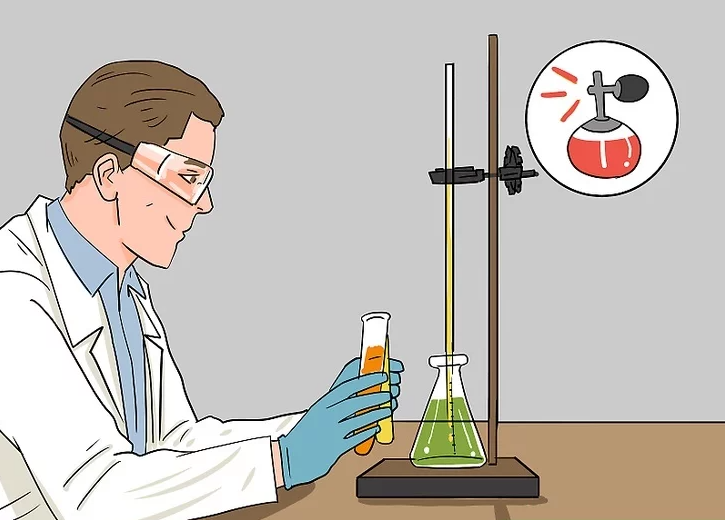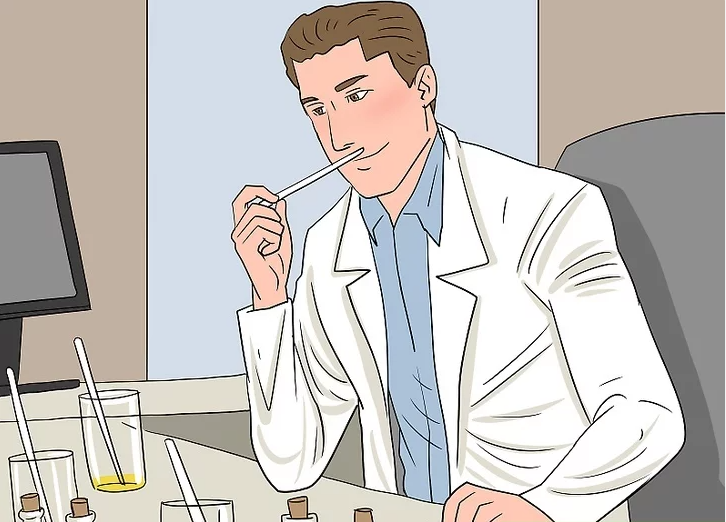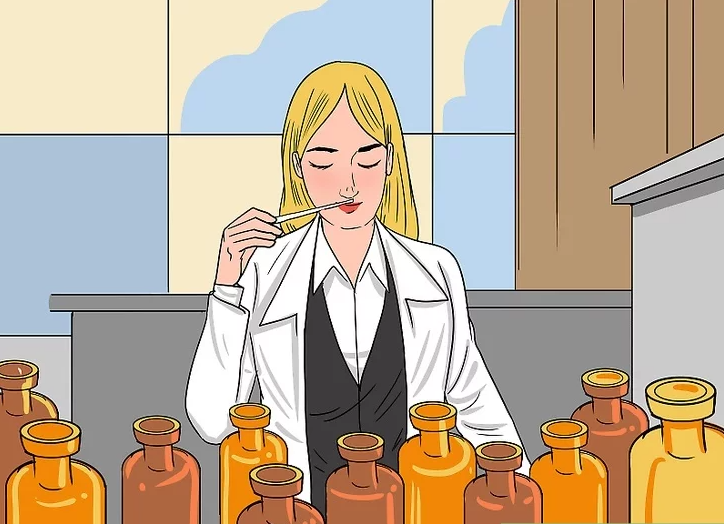How to Become a Perfumer .Becoming a perfumer is a long and challenging journey, requiring deep knowledge of chemistry, a refined sense of smell, and the creativity to craft unique, appealing fragrances. There are several paths you can take—earning a degree in chemistry, pursuing specialized training or graduate studies in perfumery, or working your way up within a cosmetic or fragrance company. No matter the route, success as a perfumer demands dedication, technical skill, and artistic vision.
Method1 Chemistry Degree

1. Enroll in a College with a Chemistry Program
Enroll in a college with a chemistry program. Most professional perfumers begin with a strong background in chemistry. Research universities in your region—or consider relocating—to pursue a bachelor’s degree in this field. This education will help you understand how chemicals interact to create fragrances and how to handle them safely in cosmetics. While a general science degree can provide a foundation, a focused chemistry program is far more advantageous.
🔗 American Chemical Society – Choosing a Chemistry Program
Why Chemistry Education Matters
Perfume creation relies heavily on chemical knowledge, making formal training essential for understanding formulas and safety standards.

2. Major in Chemistry
Major in chemistry. Some colleges require you to apply for the chemistry major after completing prerequisite courses, typically around your sophomore year. This may involve submitting an application, a personal statement, or having your grades reviewed. Other schools make the process simpler, allowing you to declare a major directly through your student account system.
🔗 Study.com – How to Become a Chemist
Why Declaring a Major Is Key
Specializing ensures you gain the in-depth chemical training needed for perfume design, laboratory work, and future career opportunities.

3. Focus on Perfumery and Cosmetic Chemistry
Focus your studies on the chemistry of perfume and cosmetics, if possible. Some universities offer advanced electives in cosmetic science, essential oils, or fragrance chemistry. Enroll in these whenever available, as they provide targeted knowledge that sets you apart in the perfume industry. Specialized training demonstrates both commitment and expertise to future employers.
🔗 Society of Cosmetic Chemists – Education Resources
Why Specialization Helps
Having direct exposure to fragrance and cosmetic chemistry makes you a more competitive candidate when applying to perfume houses.

4. Apply for Internships and Entry-Level Positions
Apply for internships and entry-level positions in the perfume industry. While completing your degree—or soon after—apply for a range of opportunities, including unpaid internships, lab technician roles, or quality control jobs. Positions such as scent evaluator or fragrance lab assistant provide real-world exposure and practical industry experience. Your chemistry background will give you an advantage over other applicants.
🔗 Internship Opportunities – International Fragrance Association (IFRA)
Why Early Industry Experience Matters
Hands-on work teaches you industry practices, builds professional connections, and gives you practical insights into fragrance development.

5. Work Your Way Up to Perfumer
Work your way up to become a perfumer. Once employed by a fragrance or cosmetics company, express your interest in advancing toward perfumery roles. Apply for promotions, demonstrate reliability, and build a reputation as a skilled contributor. Progression takes time—often several years—before becoming an apprentice perfumer under a master’s mentorship. Patience and persistence are essential in reaching this elite career stage.
🔗 Fragrance Foundation – Careers in Fragrance
Why Advancement Takes Time
Perfumery is a competitive field where mastery comes through years of mentorship, practice, and proving your creative and scientific ability.
Method2 Perfumery School

1. Apply to a Perfumery School After Completing a Degree in Chemistry
Specialized perfumery schools are designed to teach the science and art of creating fragrances, but entry is highly competitive. To apply, you’ll need at least a bachelor’s degree in chemistry and a strong academic record that demonstrates your motivation to become a perfumer. Prestigious institutions such as Institut Supérieur International Du Parfum (ISIPCA) and Givaudan’s Perfumery School accept only 12–20 students per year.
Tip: Tuition at these schools can be expensive, often costing €10,000 (≈ $11,000 USD) annually.
🎓 Education Pathway
Gaining admission to elite perfumery schools requires dedication, strong academic credentials, and financial readiness.

2. Complete Your Required Courses
Perfumery degree programs usually take 2 to 4 years to complete. Students study essential topics like fragrance formulation, raw materials, olfactory science, fragrance analysis, and perfumery technology. Coursework varies depending on the school, so it’s best to contact each institution for a detailed syllabus.
For example, ISIPCA’s curriculum covers chemistry of raw materials, sensory evaluation, and market applications (ISIPCA Curriculum).
📘 Academic Focus
The coursework combines science, creativity, and sensory training to prepare students for industry challenges.

3. Apprentice at a Fragrance Company While in School
During your studies, you’ll be required to complete an apprenticeship at a fragrance house. These hands-on experiences pair you with a senior perfumer and a creative team, helping you apply theoretical knowledge in a real-world environment. Apprenticeships are mandatory for degree completion and usually require separate applications.
See examples of fragrance houses: Firmenich and Symrise.
🧪 Practical Training
An apprenticeship provides industry exposure and builds professional connections critical for your career.

4. Apply for Jobs After Graduation
Once you earn your perfumery degree, the next step is applying for student perfumer positions. These paid roles involve close mentorship under a master perfumer and give you the opportunity to begin designing fragrances independently. Graduates from top schools like ISIPCA and Givaudan often secure positions at leading companies such as L’Oréal and Chanel.
💼 Career Opportunities
Student perfumer jobs act as the bridge to becoming a master perfumer, with strong job placement rates for graduates of prestigious programs.
🔗 References & Further Reading:
Method3Job Training

1. Apply for an Entry-Level Job With a Cosmetics or Perfume Company
Not all professional perfumers begin with a formal degree in science—some start at the bottom of a company and gradually work their way up. Consider applying for entry-level roles such as lab technician, fragrance tester, or office assistant. Use online job platforms like Indeed or Glassdoor to find openings, and also check career pages of companies like Estée Lauder or Coty.
Tip: Without a science degree, you may need to begin in a less technical position, but over time you can build experience and credibility.
💼 Getting Your Foot in the Door
Starting in entry-level positions allows you to develop industry knowledge and gain valuable practical exposure.

2. Complete an On-the-Job Training Program, If Available
Many large perfume and cosmetic corporations, such as International Flavors & Fragrances (IFF) in New York, offer internal training programs. These programs function like apprenticeships, where employees are mentored by senior perfumers and exposed to the process of fragrance design.
Be prepared: some programs require you to stay with the company for several years after completion, ensuring that the investment in your training benefits the organization.
🧪 Learning From Experts
Corporate training programs give you rare access to master perfumers and industry knowledge that can’t be learned from textbooks.

3. Work Your Way Up to Perfumer
As opportunities arise within your company, apply for roles that bring you closer to perfumery work. Over time, you’ll acquire a deep understanding of fragrance chemistry, raw materials, and the artistry of scent creation. This process can take years, but persistence and continuous learning are key to advancement.
For insights into industry career paths, see British Society of Perfumers and IFRA (International Fragrance Association).
🌟 Building a Career
Progression is gradual, but each step equips you with the expertise and reputation necessary to eventually earn the title of perfumer.
🔗 References & Further Reading